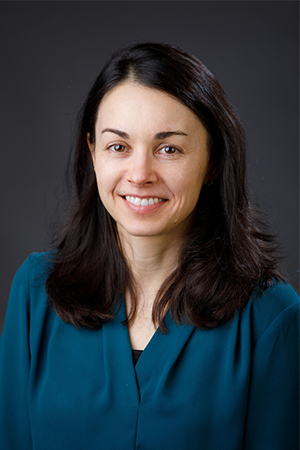Faculty Research Highlights

Dr. Yanhui Zhao, assistant professor of Marketing, published three papers in leading marketing journals, two of which were at the
Journal of the Academy of Marketing Science (JAMS). With an impact factor of 7.96,
JAMS is one of the top journals in marketing and is among Financial Times's Top 50 Journals. One of his JAMS papers examined an overlooked aspect of salesperson competitiveness - self-oriented competitiveness (SOC). This paper is among the first to investigate SOC as a personality trait. Using seven studies, including a field experiment and multiple survey studies, his co-authors and himself developed a survey scale measuring SOC and explored its managerial implications. The other JAMS article focused on the product proliferation (or product line extension) strategy; a product strategy very popular in the consumer packaged goods industry. This paper analyzed a scanner dataset consisting of 129,146 quarterly observations of brand-level sales in 29 CPG categories. They found that product proliferation is more effective in driving sales in some CPG categories (e.g., diapers, paper towels) than in others (e.g., beer, razor blades). They further found that a factor named "brand relevance in category" can explain this category-level difference.
 Dr. Brent Clark
Dr. Brent Clark, associate professor of Strategic Management, published five papers in the past year. Three of the five were published in the
Academy of Management Review (
AMR), which is widely considered the top Management journal and has an impact factor of 8.41. Of these three, the headliner piece develops a groundbreaking theory on when managers and entrepreneurs should use predictive planning approaches to strategy versus when they should pursue a more adaptive and flexible approach. The key insight is that it depends on the extent to which the uncertainty that managers face is mitigable or not. This seemingly simple formula, however, is deeply tied to the centuries-old debate on the existence (or not) of free will and whether conscious agents are a true “first cause.” The field has quickly, and strongly, reacted both for and against this new perspective, with several scholarly dialogs and counterpoints already appearing in a number of journals. The other two
AMR papers further develop this line of work. The fourth paper, published in
Corporate Reputation Review, analyzed the social media practices of every firm that has recently appeared on
Fortune’s annual “100 Best Companies to Work For” lists. Results indicated that proactive content creation and interaction on their job-oriented social media pages had no impact on firm reputation, yet the mere act of having such social media pages was crucial to firm reputation. The final paper, published in the
Cambridge Journal of Economics, commemorates the 100-year anniversary of the two most influential writings on the topic of uncertainty, both from 1921, one by Frank H. Knight and the other by John Maynard Keynes. This paper explains that Knight and Keynes held to radically different political and philosophic assumptions and, consequently, derived distinctive theories of uncertainty, much further apart than previously supposed.

Dr. Erin Bass, associate professor of Management, worked with research teams from across the UNO campus, the University of Nebraska system, and across the globe. She is the principal investigator for a grant that is part of the
National Counterterrorism Innovation, Technology, and Education (NCITE), A U.S. DEPARTMENT OF HOMELAND SECURITY CENTER OF EXCELLENCE. This grant involves several faculty from UNO CBA and focuses on Building Capacity in homeland security enterprise through the application of business analysis. Erin also serves as a primary investigator for the UNO Big Idea on Transforming Wellness and Aging Through Business, Informatics, and Gerontology. This interdisciplinary team from researchers across the UNO campus focuses on the latest trends and challenges for the healthcare and gerontology/aging industries. Her interest in healthcare has opened up opportunities to collaborate with researchers from the University of Nebraska Medical Center on diversity, equity, and inclusion in healthcare settings. In addition to research in the healthcare setting, she continues to develop a robust stream on how businesses interact with stakeholders. She was invited to present her research on this topic to faculty members at the University of Nebraska - Lincoln and to members of the Omaha business community for the Business Ethics Alliance. During the past academic year, she published original research in the
Journal of International Business Studies, the top-ranked journal for international business research,
Global Strategy Journal, and lead a symposium on the future of healthcare research for the Academy of Management annual meeting and served as a senior faculty mentor for the Academy of Management’s Junior Faculty Consortium.

Dr. Patty Bick, associate professor of Finance, worked on two papers that are currently under review. The first one is currently under 1st round review by the
Journal of Corporate Finance. Patty Bick and her peers researched the Compensation of Locally Educated Executives. They identify the location of an executive's university education as a proxy for their geographic preference. Executives whose university education took place near a firm's headquarters are paid 6.90% to 11.20% less than their peers, suggesting the transparency of university education allows firms to use the location of their headquarters as a form of intangible compensation. This geographic preference discount persists across executive subsamples, time periods, and after controlling for opaque measures of where the executive grew up. Their study shows the location of an executive's university education is a consequential component of their geographic preferences that has meaningful implications for their compensation. The second article is under 2nd round review by the
Financial Review. They researched Changes in MD&A Section and its prediction in Investment Behavior. They find that changes in managerial tone predict firm corporate investment activities. Tone changes within the Management Discussion and Analysis section of the 10-K are positively related to subsequent capital investments and M&A activity. They find the predictive content of tone changes to be present at the firm and industry-levels, and when accounting for alternative sources of incremental information associated with firm investment activities. Their findings broaden the scope of information encapsulated by changes in financial statement tone.

Dr. Youngki Jang, associate professor of Accounting worked on the firm's cost structure. His research showed that the firm’s cost structure (or operating average) is an important trait to predict its future operating performance. However, investors might not be able to evaluate the implications of cost structure because (1) information about cost structure is not disclosed, and (2) the implications depend on the macroeconomic conditions. In a paper forthcoming in
The Accounting Review, “Cost structure, operating leverage, and CDS spread”, Jang and his fellow researchers provide evidence that credit investors do not fully impound the implications of cost structure when pricing credit default swaps (CDS). Specifically, they found that future CDS spreads can be predicted using the firm’s cost structure estimated from its past accounting information. The prediction depends on the macroeconomic environment: during times of expected economic contraction, investors seem to undervalue firms that use more variable (less fixed) costs even though those firms can relatively easily scale down their activities. Their findings highlight the importance of cost structure and macroeconomic risk in understanding the pricing of credit instruments.

Jennifer Riley, William C. Hockett Professor of Accounting, has recently published several papers exploring the dominating force of technology in accounting. One of these papers, “Investigating Accountants' Resistance to Move beyond Excel and Adopt New Data Analytics Technology," has been nominated as the best paper in Accounting Horizons over the past year. The winning paper will be announced later in the summer of 2021. This paper can be found at https://doi.org/10.2308/HORIZONS-19-154. Another paper examines the topic in the classroom by bringing together data analysts from a large, local company and accounting students to collaborate on an accounting analytics project. The paper, “Engaging the Experts to Embrace the Future: An Interactive Professional Learning Experience” is forthcoming in Issues in Accounting Education and can be found online at https://doi.org/10.2308/ISSUES-19-064




